Chris Baty's Blog, page 237
May 31, 2012
I'm Blogging!
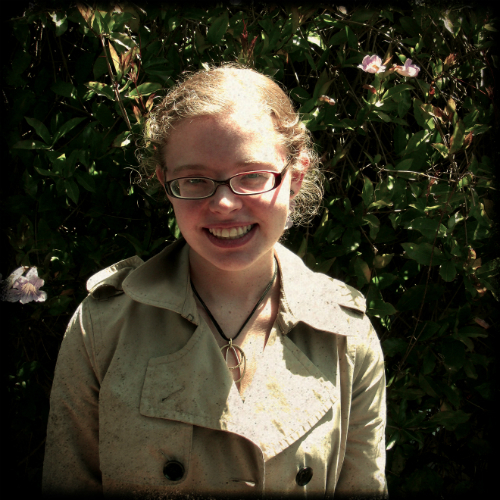
Hello there!
My name is Lydia, and I’ll be interning at OLL until the end of June. I am so excited to be working for a wonderful organization run by such awesome people.
I’m not sure if this is normal or not, but I Google myself sometimes. And nothing interesting comes up. So this post will essentially be my cyber-debut—my chance to make a good impression on anyone who Googles my name (AKA myself). So let’s see…
I hail from Tarrytown, NY, but attend Grinnell College in Iowa, where I’m a rising junior and a Psychology major. I’m an only child, but I refer to my dog, Sparkles, as my little sister (you guys can work out the biology on that one). I love reading, especially the Harry Potter series (of course!); some of my other favorites include A Prayer for Owen Meany, Room, and The Year We Left Home. I’m a crossword puzzle enthusiast, selective yet determined Urban Outfitters shopper, peanut butter fanatic, and Kardashian family groupie (yes, self, you really did just admit that to a bunch of people you’ve never met).
Well, that’s me, nutshell version. I look forward to communicating with all you Wrimos and Frenziers in the future! For starters: is anyone else willing to share some guilty pleasures with the class?
-Lydia
May 30, 2012
Eighth Grade NaNo-Novels!
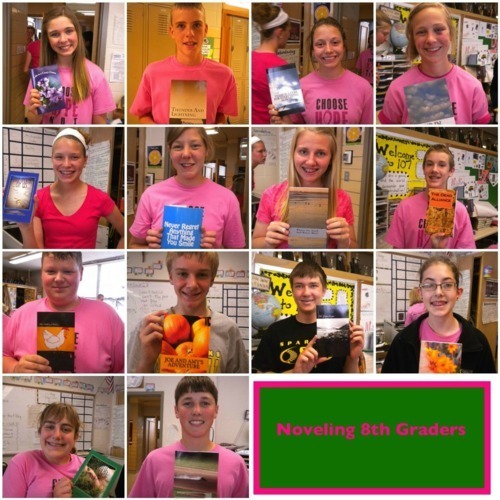
Mrs. Krebs’ eighth graders self-published their November novels! Man, they look awesome. Follow these guys’ complete NaNoWriMo journey in the class blog archives.
If you were a 2011 NaNo winner, you have until June 30 to receive your proof and order your five free copies from CreateSpace.
Already self-published your novel? How’d it go? Tell us (and shamelessly promote it) in the comments!
– Chris
May 28, 2012
NaNoWriMo at Maker Faire
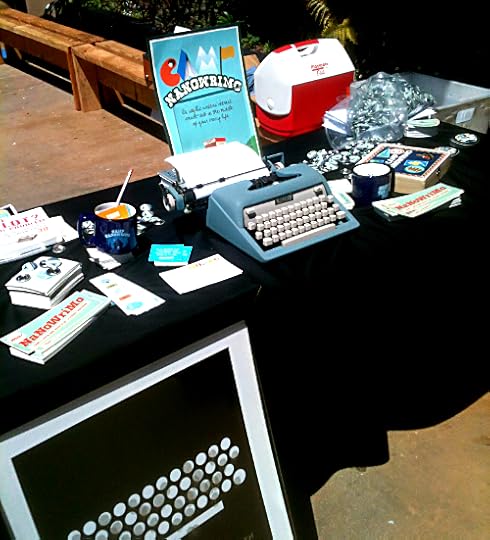
A short time ago, in a galaxy most of us call home…
Excitement and joy filled the air as people from around the world gathered for Maker Faire. Putting aside all personal squabbles, engineers, Victorian-era spies, and bounty hunters joined together to celebrate and peddle their services.
It was into this bustle that two representatives from the office full of both ABCs and glorious light arrived. Carrying the banner of National Novel Writing Month, the burden and responsibility of standing in for Wrimos around the globe weighed heavy on their shoulders.
Could writers find a place amidst this bastion of fire-breathing metal, land sharks, and robot petting zoos? The question remained…
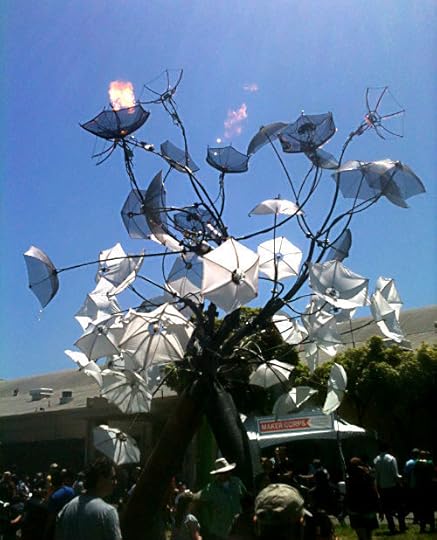
And was answered with an unequivocal yes! It was fantastic to meet so many Wrimos, and friends and family of Wrimos. On top of that, we got to introduce people to the unique challenge of NaNoWriMo, and talk up the community of people who create entire worlds in thirty days with their bare hands.
An unanticipated but hilarious perk were the kids who had never seen a typewriter before, and were mystified by this steampunk-esque contraption on our table. Parents explained how the hammers worked, guided their kids through manual returns, and asked how the email function worked (JOKES).
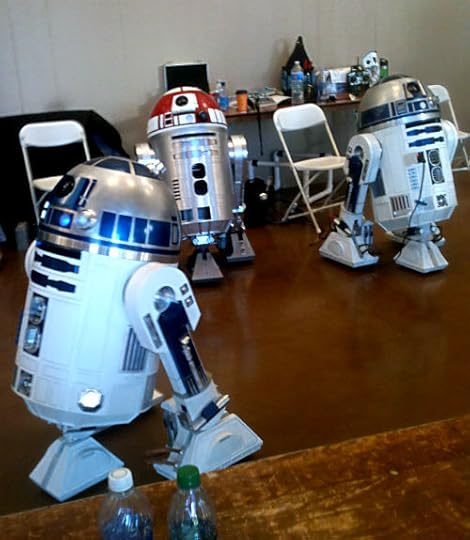
R2-D2 and his fellow astromech droids patrolled the hall outside of which our booth was set up. A good thing, too:

Still, all things considered, the Daleks were a reasonably quiet presence. Most likely a reconnaissance mission, or perhaps fully kept in check by the many bow-tied, floppy-haired men with more than a passing resemblance to our favorite doctor.

All in all, great fun was had, and many, many buttons, stickers, and flyers bearing NaNo’s slogans and crest were put out into the universe.
Thanks to Kevin at Social Imprints for finagling our last-minute jockeying for a presence, and to Maker Faire, of course, for the amazing time.
Has anyone else ever been to a Maker Faire? Will we see you there next time? And most importantly: Doctor Who vs. Star Wars—go!
Pew-pew!
May 25, 2012
Your Brain on NaNoWriMo

We’ve heard many tales over the years from Wrimos who t ap into realms of intuition and imagination as they write during NaNoWriMo. It turns out that there might be an actual change in our brains as we write with reckless abandon. Charles Limb, a doctor and musician who studies how creativity works in the brain suggests that turning off your “inner editor” opens up a flow of expression. Read on!
Tell us what you discovered when you studied the brain activity of improvisational jazz musicians?
Charles Limb: In our study, musicians played a tune they had memorized and then a tune they invented on the spot, and we observed their brain activity using brain-imaging techniques. With the shift to improvisation, a region of the brain associated with careful planning and self-censorship called the dorsolateral prefrontal cortex became dormant, while parts of the brain connected to the senses—hearing, seeing, feeling—became especially lively.
Most interesting, a brain area linked to autobiographical storytelling also showed increased activity. When jazz musicians improvise, their brains turn off areas linked to self-censoring and inhibition—and turn on those that let self-expression flow. Essentially, a musician shuts down his inhibitions and lets his inner voice shine through.
I guess the dorsolateral prefrontal cortex is what we unscientifically call “the inner editor.”
Limb: That’s not such a bad phrase. The real key is that it’s not just a single cluster of neurons that is that editor, but a whole region.
Do you think your findings about improvisational jazz could apply to improvising in writing as well?
Limb: I absolutely believe that the same thing could apply to writing. The idea that you can get into the zone of writing and that you can get into the zone with music is very analogous. Many, many writers, I’m sure, are surprised at what is coming out of their fingertips, or out of their head, or off their pen. As they write, there’s some sort of effortlessness that can take over when you’re really in the zone.
You’ve also studied rap improvisation. What did you discover about the act of writing, or creating?
Limb: When you go from reciting a memorized rap to improvising a freestyle rap, activity in the language area shoots way up in the brain, even though both tasks are language tasks. You might think that writing down something you’ve memorized is the greater, more complex task, but when you start writing down something you’re making up, your language areas in the brain go up.
We saw in our experiments that whenever you go from memorized to improvised creation, brain activity in your sensory areas goes up. Many people are not cognizant when this is taking place, however, because they’re so immersed in the zone that they forget where they are. They’re zoned out; they’re concentrating on their writing. All of a sudden they disappear into their own little cocoon.
Is this “trancelike” improvisational state accessible only by those with improvisational experience, or can amateurs reach the same place?
Limb: I firmly believe that amateurs can reach a state of flow, but that it is easier for experts, in any discipline. I think that is part of what training enables. But even a cursory observation of children engaged in simple art activities is evidence that a deep state of immersion can take place without any training at all.
Do you see any long-term cognitive benefits of regular improvisation—in any art form?
Limb: Every brain function study I’ve done of creativity has shown that the whole brain is engaged during creativity above-and-beyond what is required for regular functioning. Because of that engagement of the whole brain, it just extends to reason that creativity or improvisation engages the mind in a way that few other activities do.
Creativity in a nutshell is problem-solving taken out of context. I really do think that regular engagement of these types of behaviors is very important in terms of mental acuity. A well-developed brain is trained in many different ways from many different angles. It’s a real mistake to ignore the importance of the creative aspect, not to mention the fact that there is probably a major component of happiness and personal fulfillment that is granted through these kinds of things.
Do you think students should be taught improvisation in schools? Can creative behavior be learned?
Limb: Yes, I do believe they should be taught improvisation—it is a perfect model for problem solving. Creative thinking is a different form of thinking than the convergent thinking of most educational approaches, and an important one for lateral associations and insight. I think creative behavior can be learned, but that there are also different levels of intrinsic aptitude for specific disciplines—for example, music or painting.
Are you interested in possibly studying writing in the future?
Limb: I would be very up for the idea of studying improvisation in writers using brain-imaging techniques. I don’t currently have the funding to do so, but I would definitely be willing to participate or collaborate in such a study.
For more, watch Charles Limb’s TED talk on his research. And t ell us what wild shenanigans go on in your brain-works during NaNoWriMo!
Image credit: Charles Limb.
May 23, 2012
Introduction and Recipe for One OLL Intern
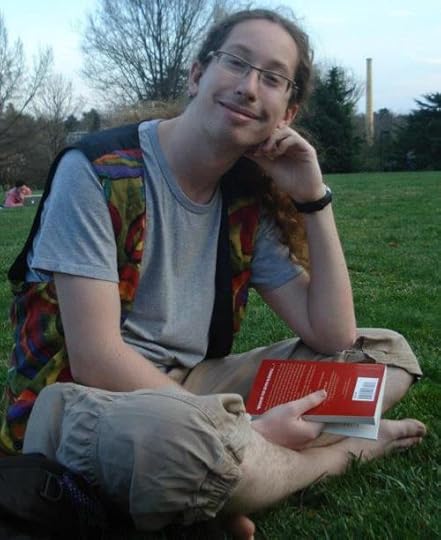
Hello, campers! I’m Ben, your new OLL intern, and summer camp counselor!
I’ve spent much of my life working at one summer camp or another, but this one may be the strangest. I’ve worked at space camp and adventure theater camp, but I’ve never worked at a camp where I only meet the campers online before! I’m thrilled to be here, and eager to help with Camp NaNo. Areas of my expertise include fireside storytelling, surviving camp food, avoiding dehydration, handling homesickness, and of course pranking other cabins.
Wondering what makes an OLL intern? Read on for the recipe below:
Recipe for One Letters and Light InternIngredients:
1/3 college student
1/3 aspiring novelist
1/3 camp counselor
2 lbs. curly hair
3 NaNo victories
1 storytelling obsession
27 vests
1 semi-complete novel draft (lightly toasted)
2 3/4 cups naive enthusiasm
1 jar of Nutella
2 batches of cookies
Preparation:
1. First, give the college student three years of linguistics and creative writing (education at Swarthmore College specifically is optional), but make sure that he hasn’t graduated yet.
2. The camp counselor should be sent back to work at the same camps he went to as a child—preferably things like space camp and improv theater camp. The stranger the better!
3. Give the novelist plenty of innocent idealism, and lots of good teachers and inspiring mentors. Make sure he works his way through at least three years of NaNo (plausibly preceded by one false start). You’ll know he’s ready once he’s finished a first novel draft and set it aside to work on an even better one.
4. Combine in a mixing bowl. Stir vigorously. At this point it’s important to keep the mixture disoriented, preferably by abruptly dropping him back in his hometown after three years away.
5. Once the mixture has reached a smooth consistency not unlike melted cheese, begin stirring in the enthusiasm and obsession. Stir until fully blended.
6. Cover the bowl in vests, and put it in a fridge for one week.
7. Remove from vests and fridge, and put it in a pot and bring to a low boil. Let simmer for one hour.
Garnish with Nutella. Will make and serve the cookies, if prepared properly. Serve hot. A single serving should last for one summer, full of mad dreams about growing up to be a novelist, and following in the footsteps of authors like Garth Nix, Jim Butcher, and Douglas Adams.
—Ben
May 22, 2012
"Bye Bye Bye" - N'Sync

Well, today is my last day as an intern here at Script Frenzy. When I think about it, it’s amazing how much my life has changed in the duration of just four months. There have been a lot of transitions: leaving my apartment to move back home, leaving UC Berkeley, and now leaving the Office of Letters and Light. However, I know all these endings will lead to new beginnings.
This internship not only exposed me to Pie-day Fridays, and to so many exciting people, but also to my love of aesthetic design. With the Adobe Suite, I’ve created many images that have been put to good use, and I really enjoy doing it. It made me realize that design is something I want to explore further career-wise, so thank you for letting me share that with you all on the blog, and through our site!
I also got to experience the background work of putting together such a large nonprofit event. And when I start writing my NaNoWriMo novel in November, I’ll know what’s going on behind the scenes!
As for my immediate future, I was accepted into a Creative Writing program over at SFSU. I’ll be starting there this August. And this summer I’ll be doing exciting, productive things like sleeping in, learning to ride a bike, thinking of getting a job, sitting on the park bench pictured above, and volunteering at the animal shelter!
Finally, I’d like to take a moment to thank all of the people here at the Office, and also all the participants of Script Frenzy. It is truly inspiring to see people get excited about writing! Keep on!
-Aliza
May 21, 2012
A Frenzied Festival of Plays
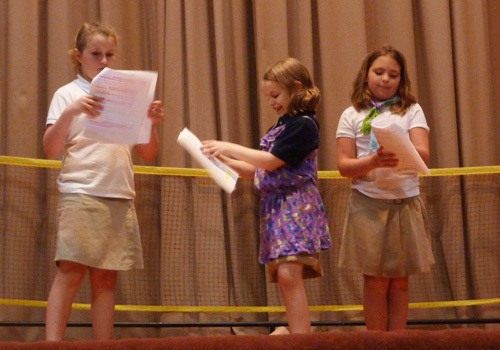
Educator Cynthia Garcia doesn’t just teach noveling or scriptwriting to one class at her school in Fairmont, WV. She brings both NaNoWriMo and Script Frenzy to the whole student body. We always love her enthusiasm and were excited to hear how her April went. Here’s what she told us about the school’s first ever “Frenzy Festival.”
April was pretty chaotic at our school. Between Easter break, spring break, standardized testing, and “weather days” (Fridays off of school to substitute for the snow days we had built into our calendar but didn’t use), we only had a handful of actual school days all month.
Two years ago, I might have figured April for a lost month, but that was before two NaNoWriMos and a Script Frenzy. I knew better. I put up my “Script Frenzy is Coming!” posters in March, sent for my classroom kit, and let the buzz begin.
When we did our first NaNoWriMo in November of 2010, we started with about a dozen sixth, seventh, and eighth graders; before the end of the month we had been joined by a handful of fifth graders and had piqued the curiosity of the whole school. Our first NaNoWriMo was such a roaring success that when Script Frenzy rolled around, we almost doubled our numbers and expanded our range down to third grade. NaNoWriMo 2011 saw another increase in numbers, and for Script Frenzy 2012, we had over 60 students in grades two through eight. What makes those numbers even more remarkable is that:
Sixty students is almost a third of our entire student body.
It’s not actually always the same students—so in fact, almost half of the school population has been involved.
None of the work we do is tied to a class—it’s all afterschool, during morning study hall, at lunch, or at home.
So after Script Frenzy 2012, I wanted to do something special to celebrate my students’ accomplishments. I knew most of them had never had a chance to act on a real stage, and I remembered how challenging it had been to showcase script excerpts in my classroom at our wrap party. I decided to hold an afterschool Frenzy Festival on the school stage the first Friday in May.
None of us had any idea what to expect. I’d encouraged students to sign up beforehand; I’d offered practice time afterschool; I’d given advice about how to excerpt a coherent section from a completed script—but we had been in Frenzy mode for so long that the freewheeling mentality took over. Seventh graders stacked bits of costumes at the back of the room; second graders handed me crumpled papers full of densely packed handwritten text to duplicate; sixth graders recruited their friends to come act in the crowd scenes.
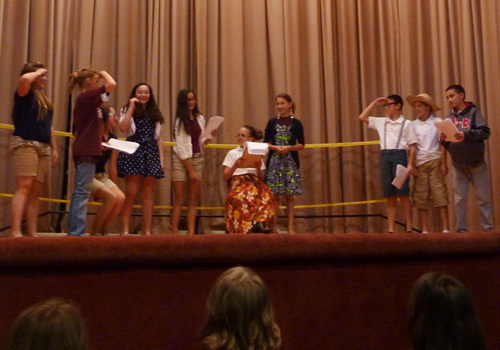
On the day of the Festival, excitement and confusion were both running high. Once everyone had trooped to the gym and stacked shoes and bookbags in the bleachers, I took a final survey and scribbled a quick list of plays and casts. I had told parents they were welcome to attend but all the same I was a little horrified when many of them started showing up—after all, I knew students could expect sympathy and interest from their fellow Frenzy participants, but I was unsure about the tolerance of people who hadn’t bonded in adversity.
Astonishingly, it worked. Not that what we did was good theater, or even passable theater: the best of it was fun and silly, and the worst was kind of excruciating—not surprising, since I had put a pack of 7- to 14-year-olds on stage, given them an audience, and allowed them to do whatever they liked. There were lots of oddly choreographed ninja battles and confusing animal impersonations and unscripted dance numbers; actors kept entering and exiting at the wrong times and losing their places in the script; and the second-grade play about the magic dog looked like it might go on forever.
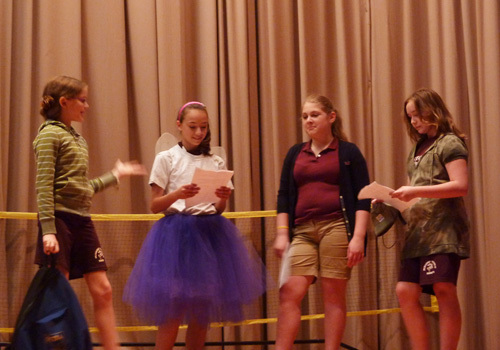
But it was okay. After a month of Script Frenzy, we had all learned that perfection is overrated and that the goofy, surprising journey of discovery is often the fun part.
Humble as it was, the First Annual Fairmont Catholic Elementary School Frenzy Festival was very much in the spirit of Script Frenzy: we had fun, we tried something new and challenging, we saw it through to the bitter end, and we supported each other. Those are all beautiful things, and I was glad and grateful we had an opportunity to experience them.
May 18, 2012
“I Sold My NaNoWriMo Novel!” A Q&A with Marissa Meyer
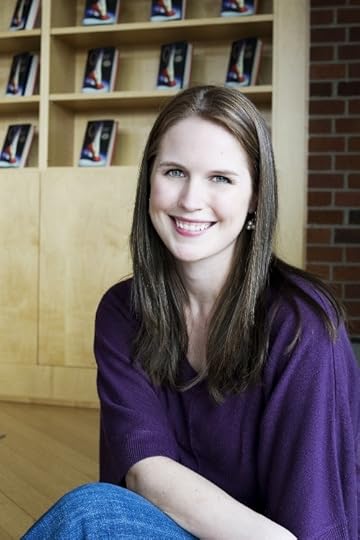
We are thrilled to introduce Marissa Meyer, long-time Wrimo and YA fiction writer, who joins us to talk about her debut novel, Cinder, which came out in January from Feiwel & Friends, an imprint of Macmillan.
Can you tell us a bit about Cinder?
Of course! Cinder is a retelling of the classic Cinderella story, but with a science-fiction twist. Our heroine, Cinder, is a sixteen-year-old cyborg, meaning she’s part-human and part-machine. In a world where cyborgs are considered second-class citizens, Cinder earns her keep in her stepmother’s household by working as a mechanic at the weekly market. Her reputation brings the handsome Prince Kai to her booth one day, and soon Cinder is caught in a political battle of wills between Earth and the Lunars—an evolved species of humans who live on the moon and have developed powers of mind-control and manipulation.
Cinder is the first of what will be a four-book series called The Lunar Chronicles, each of which is inspired by a different fairy tale. Book 2: Scarlet, based on Little Red Riding Hood, will be out in January.
What’s the connection between NaNoWriMo and Cinder?
The first three books in The Lunar Chronicles (Cinder, Scarlet, and Cress) all started life as NaNoWriMo novels. Actually, they were all drafted out during a single NaNoWriMo. It was 2008 and I had heard about a contest in which the Seattle-area writer who clocked in with the most words during November would win a walk-on role in an upcoming episode of Star Trek. Being both a geek and a chronic overachiever, I knew I had to give it a shot, so I ended up writing the drafts of three novels instead of one. My grand total was 150,011 words. Unfortunately, it wasn’t enough to win the contest (I came in third place!), but at least I finished with three novels that I was really excited about.
How did you come to find out about NaNoWriMo, and what convinced you to participate?
I wrote Sailor Moon fanfiction for many years, and early one December I decided to start posting my daily word count goals on my blog as a method for motivation. A friend commented that it was too bad I’d just missed NaNoWriMo, and I was like, NaNo-what-o? So she pointed me to your Web site and I immediately started looking forward to the following November when I could join in the festivities. (I would take part and finish two NaNos prior to the one in which I wrote Cinder.)
How complete was your book by the end of the event?
I’d finished the first draft, and then some. Cinder came in at around 70,000 words, the second novel (Scarlet) was right around 50,000, and then I’d gotten 30,000 haphazard words into Cress. However, all three of those novels have had to be completely scrapped and started over from scratch during revisions—which is just fine by me. I may not produce anything of quality during NaNoWriMo, but I always come away with a great roadmap.
What is your writing practice like? Do you tend to plot your writing in advance or do you prefer to fly by the seat of your pants?
These days, I’m a neurotic outliner. I’ll spend weeks, or even months, brainstorming and plotting and rearranging notecards and making character-arc charts and, just recently, playing around with the color-coding features in Scrivener. Then I start writing. Ironically, everything usually ends up changing about a third of the way through the draft and I have to revise my outline as much as I revise the actual book.
What lessons did you learn from revising Cinder that surprised you? Any revision regimens you swear by?
Although I had some experience revising stories during my fanfiction years, I wasn’t prepared for how much work would go into making something truly publishable. But I’d heard all the statistics about querying agents and going on submission and how difficult it is to get published, so I knew that I didn’t want to send Cinder into the world prematurely. It was important for me to know I’d written the best book I could in order to give it a good shot at success, which in the end took almost two entire rewrites, six or seven revision rounds (including being seen by eight beta readers), and countless polishing and editing drafts.
One revision tactic that’s worked for me is, once the plot is feeling solid, say after the second or third draft, I grade the suspense level of each chapter on a scale of 1 to 10. If there are any chapters beneath a 5 or a 6, I find a way to delete them or increase the tension. I also check that 8s and 9s are followed by calmer “reaction” scenes, or even a comedic interlude, so readers don’t feel frazzled from suspense overload. And of course, if the ultimate climax scene isn’t a 10, there’s a problem.
What was the process of shopping this book like?
After all that time spent polishing it, the submission process went surprisingly fast. I started querying in mid-August 2010, and two months later I had offers of representation from three agents, including the very first agent I’d queried, who I then signed with. She and I worked on our submission package for about two weeks and she sent it to publishers on a Friday afternoon. We had our first offer the following Monday, which happened to be November 1, exactly two years from the day I’d started writing Cinder. A week later, the series went to auction before we accepted the offer from Macmillan’s Feiwel & Friends. From first query to book deal was just under three months, and what a dizzying three months it was!
Are you taking part in NaNoWriMo this year?
I hope so! I couldn’t participate last year due to my first real deadline, but if all goes well, I’ll be joining in this year with a brand new novel. I have a few ideas for the “next project” that I’m excited for, so I’ll be working very hard over the summer to make sure I can take a break from The Lunar Chronicles to start something new. I can’t wait!

May 17, 2012
Later Guys!
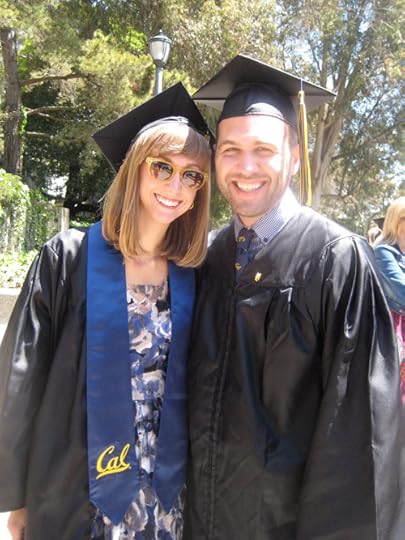
Today is my final day interning at the Office of Letters and Light, which is pretty nuts considering it feels like it was just last week that Tim asked me to write my introductory blog post. I can’t believe that Script Frenzy and all of its writing madness is already over, and that my time with OLL has come to an end. But despite the brevity of my internship, I’ve had a ton of fun working with the OLL staff, and I’ve gotten a taste of what it means to work at a nonprofit.
Since starting here I’ve been consistently blown away by the incredible passion and drive of the staff. Everyone at OLL works tirelessly to orchestrate the OLL programs and serve participants because they sincerely believe in the value of creative writing. I would never have guessed how much time went into organizing these virtual events; it’s truly impressive what these people (and you!) accomplish every year.
I’d like to thank everyone here at the Office of Letters and Light for the opportunity to work with and learn from them. Thank you for your unending patience when you realized how horrible I am with technology (aka Photoshop, iMovie, and anything involving HTML); now I can reformat pictures and upload movies like a champ.
And I want to thank all of you, our Frenzy-folk, for including me on the Script Frenzy team: it was very exciting to be a part of something so large, and what I believe is very important. Thank you for exposing me to scriptwriting. If it wasn’t for Script Frenzy, and your company and encouragement, I probably would have never attempted a screenplay.
The Office of Letters and Light is an awesome place and I’m going to miss it, but at least I know that I’ll always be able to stay in touch through the NaNoWriMo and Script Frenzy community. So keep an eye for me in the forums; I’ll be around!
- Jessie
May 16, 2012
Didn't Finish the Script Frenzy Challenge? It's OK, We Tried
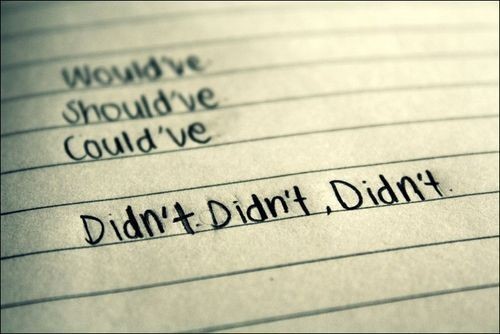
In middle school, I had a science teacher who, if you didn’t turn in your homework for the day, would make you stand up in front of the whole class and give a reason why. Of course, science was never my strong point, so, at least once a week, I would have to stand and explain where my homework was. Now that I think about it, maybe this was my first brush with creating fiction.
I never went with the classic, “My dog ate it,” but did try to explain my lack of homework with excuses such as: “My soda exploded on it,” “I left it at the library,” or “My mom threw it away”. Those are believable, right?
Anyway, what I’m trying to get at here is that excuses are for excruciatingly boring homework assignments, and maybe work—not for the mad joy of Script Frenzy. And because of that, I admit with a clear conscience that I didn’t finish my script this April. Unfortunately, I fell about sixty pages short.
I can sit here and deliver excuse after excuse for why I didn’t finish, but you know what? Script Frenzy isn’t homework—it’s an amazing and fun challenge that I’m glad I got to take part in. I’m proud of the carefully crafted pages that I have, and I don’t feel as though I have to explain myself. I tried, which is so much of what matters, right?
So if you weren’t able to fully complete the Script Frenzy challenge, hold your heads up high where I’m keeping mine. Whether you finished with ten or ninety-nine pages, you should be proud. Pat yourself on the back. Take yourself out for a milkshake (random, I know, but it sounds good!). You tried something. You were a part of something.
So whether you finished the challenge or not, how did (or how will) you celebrate? How many of you added to your scripts since April 30th?
- Aliza
Chris Baty's Blog
- Chris Baty's profile
- 63 followers



